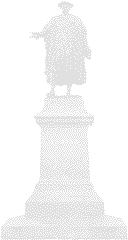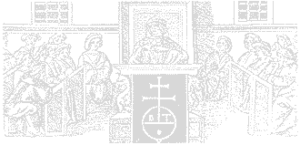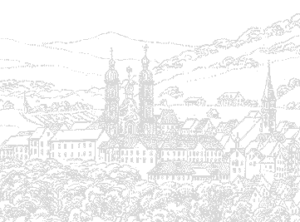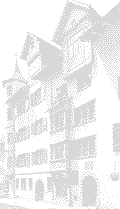The St. Gallen Reformation is inconceivable without Vadian. Thanks to him, it was carried out in the first place. Without him, it would probably not have been able to hold its own in the confusion of the time. Who was he?
Vadian’s childhood
 Vadian was probably born in 1484. He and Zwingli were therefore probably contemporaries. Vadian – or as he was actually correctly called: Joachim von Watt – was the scion of an important St. Gallen merchant family. As a partner in the Diessbach-Watt trading company, they had contributed a great deal to the spread of St. Gallen canvas throughout the world. In addition, they had also provided the city with several high politicians up to the mayor.
Vadian was probably born in 1484. He and Zwingli were therefore probably contemporaries. Vadian – or as he was actually correctly called: Joachim von Watt – was the scion of an important St. Gallen merchant family. As a partner in the Diessbach-Watt trading company, they had contributed a great deal to the spread of St. Gallen canvas throughout the world. In addition, they had also provided the city with several high politicians up to the mayor.
Young Joachim was intellectually gifted. He was sent to the city Latin school, where he learned arithmetic, reading and writing, «frömd und haimsch» i.e. Latin and German. The main subject was Latin grammar, because the goal of the Latin school was the perfect mastery of this language. As Vadian himself tells, this was not without frequent beatings. One of the duties of the students was to sing in the services of the cathedral.
Vienna years
At the age of seventeen, rather late by the standards of the time, Vadian moved to the famous university of the imperial city of Vienna. It is already clear from the previous chapter that he possibly made the acquaintance of his compatriot Zwingli there. Vadian’s first semester in the winter of 1501/02 coincided with Zwingli’s last.
Like all freshmen, Vadian enrolled in the Faculty of Arts, where he expanded his knowledge of Latin grammar and literature. In 1508, he attained the highest title that the Faculty of Arts could confer: that of Magister.

The University of Vienna was in a state of upheaval at that time. A modern humanistic direction, committed to the spirit of the Renaissance, fought against the representatives of the medieval school philosophy, who wanted to see in the artistic faculty only a preliminary stage of the higher theological faculty (according to the medieval view, all sciences were servants of theology).
Vadian did not hesitate to join the avant-garde humanistic direction. From then on he counted himself among those scholars who made the study of ancient literature, especially Latin literature, an end in itself and their purpose in life. They admired the wisdom and elegance of the non-Christian thinkers of antiquity. Yes, they strove to build a neo-Latin culture a thousand years after the fall of the Roman Empire.
Thus, they themselves began to write poetry in Latin. The outward sign of the young St. Galler’s turn to humanism was his change of name. Joachim von Watt became Joachimus Vadianus in Latin (today we usually say Vadian for short).
Step by step, Vadian climbed the steps of an illustrious scholarly career. He became a professor at the Faculty of Arts and even received its most important chair in 1516. While he himself continued to learn, he was at the same time a teacher. Together with colleagues and students he lived in a monastery-like community. It was not customary for a professor of that time to marry. Vadian took fatherly care of some of his students, such as his later brother-in-law Konrad Grebel and Jakob Zwingli, Ulrich’s younger brother.
In true humanistic fashion, Vadian composed a large number of Latin writings in verse and in prose. Much of it was quickly thrown down in the wordy humanistic average style. But among them there are also such witty and funny little works as the «gallus pugnans» and such a weighty book as «De Poetica et Carminis ratione». The former is a kind of «trial» between chickens and roosters and their lawyers, with the chickens making fun of the quarrelsome roosters in a rather emancipated manner. The latter is a comprehensive literary history.
Part of being able to write was being able to talk. When an international conference of princes was held in Vienna in 1515, Vadian had the honor of delivering the welcoming address to the King of Poland!
Like many contemporaries, Vadian longed for the greatest humanist fame imaginable: to be able to call himself «poeta laureatus», i.e., «poet crowned with laurel». In 1514, the goal was achieved. In a solemn ceremony, Emperor Maximilian awarded the evergreen poet’s wreath (for lack of laurel, it was made of box!), the poet’s ring and the poet’s diploma to Vadian, who was kneeling before him. Even more significant was that in the winter semester of 1516/17 Vadian was found worthy to hold the highest office of the university, the rectorate.
Vadian was not only concerned with literature. Rather, he embodied the type of universal man that was aspired to in the Renaissance period as the perfection of human existence. Vadian trained himself as an expert in many fields of knowledge. He studied geography and for this purpose tried to get to know as many regions as possible from his own perspective. He made trips to Italy, Hungary and in 1519 (already from St. Galler) to Germany, Silesia and Krakow. He also climbed Mount Pilatus near Lucerne to find out what the legendary Pilatus soul was all about, and contrary to all the warnings of the locals, nothing happened to him!
He acquired good knowledge in mathematics and astronomy.
He was also fond of music; for a while he even worked as a teacher of the Vienna Boys’ Choir. In 1512, in addition to his other duties, he began to study medicine, which he completed in 1517 with a doctorate.
The return to St. Gallen
But this already brings us to the decisive turning point in his life. The decision to study medicine was connected with thoughts of a possible return to his hometown. If he wanted to settle in St. Gallen, he had to pursue a practical profession. All his humanistic titles were of no use to him back home.

Vadian had worked his way up to become one of the most famous humanists north of the Alps. But in 1518 he left his previous place of work, Vienna, and returned to small, modest St. Gall. What motivated him to do so? How can this striking bend in his life be explained? First of all, it is certain that Vadian loved his hometown very much and felt Swiss.
He envisioned transforming Switzerland, hitherto known only for its martial prowess, into a place of learning. He saw his future role as a practical doctor, but also as an advisor, helper and educator of his city and the whole Confederation. Vadian’s return home is not directly related to the Reformation that was just then beginning in Germany. But he seems to have sensed that the humanist ideals were fading and new ideals were on the rise. The humanistic bustle, this science for science’s sake, did not satisfy him in the long run. In 1530, he dismissed his once-hotly coveted poet’s coronation as «juvenilis insania», i.e., «youthful madness». In the long run, he was more attracted to a simple but realistic existence in St. Gall than to the grandiose but somewhat artificial and unworldly scholarly life in Vienna.
 Soon after his return, as he had hoped, Vadian was appointed city physician and general counselor. Now he could think about getting married. His wife became Martha Grebel, who came from the Zurich city nobility. The matchmaker was her brother, Vadian’s friend Konrad Grebel, who would play a leading role in the Anabaptist movement a few years later. In the spring of 1520, Vadian and his wife moved into the house «Zum tiefen Keller» in the Hinterlauben. There their daughter Dorothea, called «Durlin», was born. With Vadian’s entry into the Small Council as successor to his late father in the summer of 1521, his political career also began.
Soon after his return, as he had hoped, Vadian was appointed city physician and general counselor. Now he could think about getting married. His wife became Martha Grebel, who came from the Zurich city nobility. The matchmaker was her brother, Vadian’s friend Konrad Grebel, who would play a leading role in the Anabaptist movement a few years later. In the spring of 1520, Vadian and his wife moved into the house «Zum tiefen Keller» in the Hinterlauben. There their daughter Dorothea, called «Durlin», was born. With Vadian’s entry into the Small Council as successor to his late father in the summer of 1521, his political career also began.
Along the way, Vadian still had enough time to continue his studies. He began to occupy himself with theological questions and read Luther’s writings and books by other reformers. In his conscientiousness, however, he also obtained publications by opponents of the incipient Reformation. For several years he kept quiet to the outside world. One did not know what he thought and where he stood. He did not allow himself to be pushed and wanted to consider his decision – and it had to be made one way or the other – in peace. He was anything but on fire for the Reformation from one day to the next.
One thing can be said: Vadian, who was a layman (i.e. not a priest), acquired knowledge in theological questions during these years that few contemporary churchmen possessed.
MARIANNE UND FRANK JEHLE:
Kleine St. Galler Reformationsgeschichte, Viertes Kapitel
Herausgegeben vom evang.-ref. Kirchenrat des Kantons St. Gallen
St. Gallen: Zollikofer Fachverlag AG, 1977
ISBN 3-85993-012-5